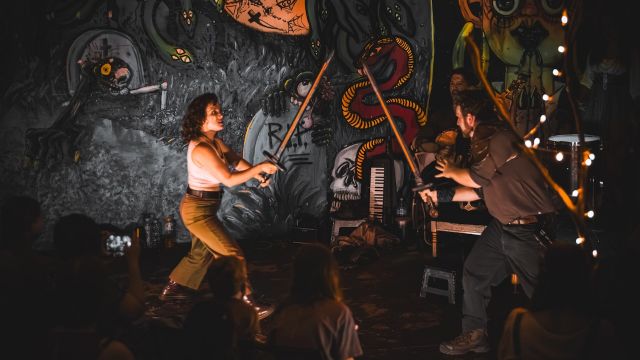Macbeth
The Barden Party, from NZ, can take a Shakespeare play, trim it, leave out characters, do some gender bending, add Bluegrass music songs and yet, amazingly, leave the play’s emotions and drama intact. They do all that with their interpretation of Romeo and Juliet, but there’s comedy as well. Tragedy it remains, but their Romeo and Juliet is also enormous fun. With their Macbeth, the intent is more serious. Adapted and directed by Laura Irish, the gender bending isn’t arbitrary or funny – it’s focussed and deliberate.
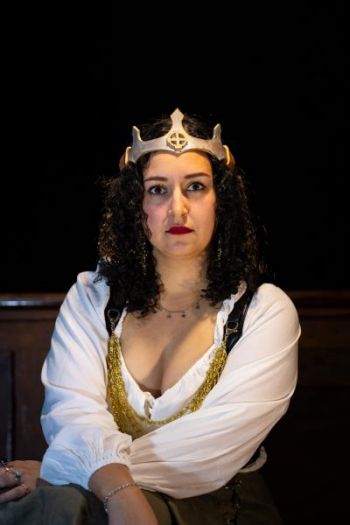 I can be a little dubious about gender blind casting because so often it is arbitrary (or it feels that way), achieving little but ‘balance’. Here, like the recent, hilarious and very pointed gender switch Macbreast at La Mama – a show that targeted male vanity and stupidity - the Barden Party takes Macbeth and make a serious, radical, wholesale gender switch. It is a kind of conscious experiment and investigation into gender roles – without even changing the pronouns.
I can be a little dubious about gender blind casting because so often it is arbitrary (or it feels that way), achieving little but ‘balance’. Here, like the recent, hilarious and very pointed gender switch Macbreast at La Mama – a show that targeted male vanity and stupidity - the Barden Party takes Macbeth and make a serious, radical, wholesale gender switch. It is a kind of conscious experiment and investigation into gender roles – without even changing the pronouns.
Kings become Queens – so, Queen Duncan (Tara McEntee) loses saintly virtue and becomes a bit of a roisterer, drinking with the troops. Malcolm can seem a bit girly anyway but here Julia Guthrey clinches it – but then she is absolutely terrifying as the expressionless Murderer Macbeth dispatches to kill Lady Macduff and her children. The Witches become the ‘Wyrd Brothers’ (Wiremu Tuhiwai, Hamish Boyle and Caleb James) awhoopin’ and ahollerin’ like a bunch of bogan blokes, revelling in destruction - and feeling like a threat to the audience too.
As Ross, gangly Boyle is like a jerky marionette operated by a drunken puppeteer. Criss Grueber in a wheelchair with banjo and guitar is Banquo. (At the start, Caleb James, who’ll play Macduff, tells us that Grueber belongs in the wheelchair and that we are not to worry about him. Grueber grins and nods agreement.)
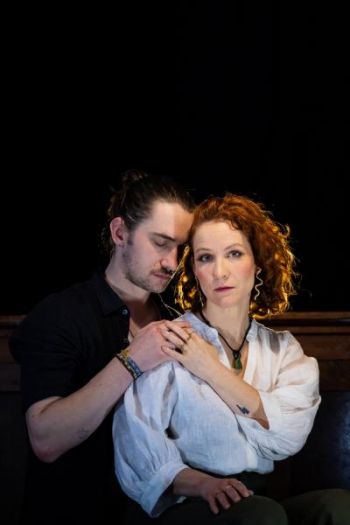 And adapter and director Laura Irish herself becomes Macbeth. She does not butch it up; she doesn’t strut, pretending to be a man or a parody of a man. Instead, she remains a woman with the actions of a man: she is talked into murder, yes, but then becomes steely, fearful, vicious force majeure, set, blank, and finally despairing and resigned. Ollie Howlett (musical director also) becomes Lady Macbeth – but he plays it as a man, even including ‘unsex me here’ – urging Macbeth on to the murder (the big speeches are all here) and trying to hold Macbeth together afterward and then degenerating into guilt and horror-driven madness as the play proceeds. It is revelatory what these role changes do. – and we see these characters in a new light and wonder at it. When Irish as Macbeth says, ‘I dare do all that may become a man; Who dares do more is none’ – we might think more sharply than usual, what is a man? And there is an implication too of Macbeth as a woman thinking, ‘I can do what a man does.’
And adapter and director Laura Irish herself becomes Macbeth. She does not butch it up; she doesn’t strut, pretending to be a man or a parody of a man. Instead, she remains a woman with the actions of a man: she is talked into murder, yes, but then becomes steely, fearful, vicious force majeure, set, blank, and finally despairing and resigned. Ollie Howlett (musical director also) becomes Lady Macbeth – but he plays it as a man, even including ‘unsex me here’ – urging Macbeth on to the murder (the big speeches are all here) and trying to hold Macbeth together afterward and then degenerating into guilt and horror-driven madness as the play proceeds. It is revelatory what these role changes do. – and we see these characters in a new light and wonder at it. When Irish as Macbeth says, ‘I dare do all that may become a man; Who dares do more is none’ – we might think more sharply than usual, what is a man? And there is an implication too of Macbeth as a woman thinking, ‘I can do what a man does.’
After the murder (the messy and not too believable business of the blood-smeared grooms is elided) Barden follows Shakespeare with the drunken Porter – here brilliantly realised by Tara McEntee, who has the audience roaring with laughter. But that comic relief, of course, cannot last.
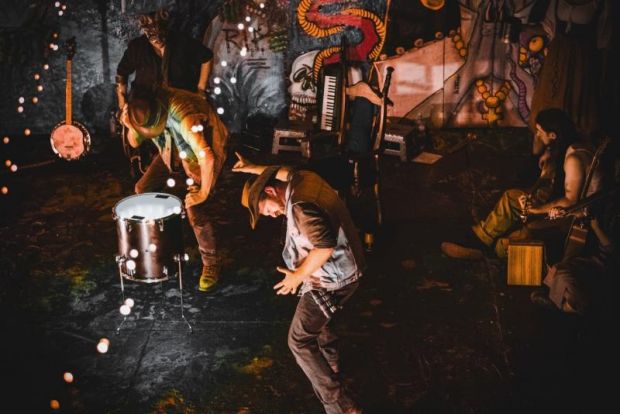
The interpolated Bluegrass songs – now more mournful and grieving - continue, but what is most striking as murders ensue and there is more mayhem is the way Irish elects to have Macbeth sit motionless and expressionless on the ill-gotten throne – as if at the centre of a vortex. I was shocked at the omission of Macbeth’s dismissive non-reaction to Lady Macbeth’s death – ‘She would have died hereafter – but perhaps Irish decided it would not work in the light of her ending – that is, her take on Macbeth’s ending. Only as the Wyrd Brothers’ predictions come into force does Macbeth rouse him/herself and face death at the hands of Macduff – albeit with another twist as Macbeth affirms, ‘Lay on, Macduff...’ and runs onto Macduff’s sword. Overall, this is an illuminating, thoughtful and highly intelligent adaptation.
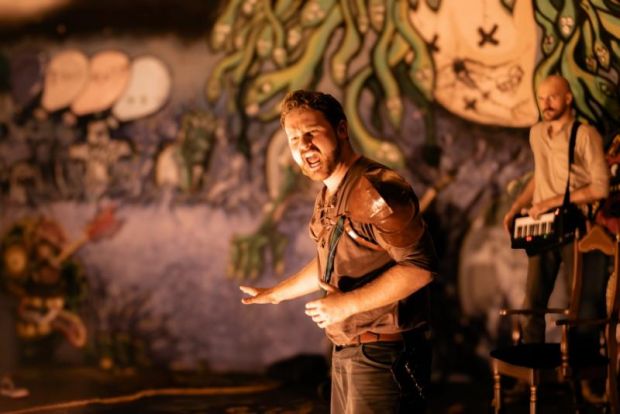
The origins of the Barden Party can be found in my review of their companion piece – Romeo and Juliet (click here to read the review). All eight of this troupe of travelling players are hugely talented actors, comedians and musicians. Their resources are minimal, but they throw themselves into their doubling up and gender switching experiments with complete commitment, knowing exactly what they’re doing and knowing too just how they connect with their audience.
Michael Brindley
Subscribe to our E-Newsletter, buy our latest print edition or find a Performing Arts book at Book Nook.

